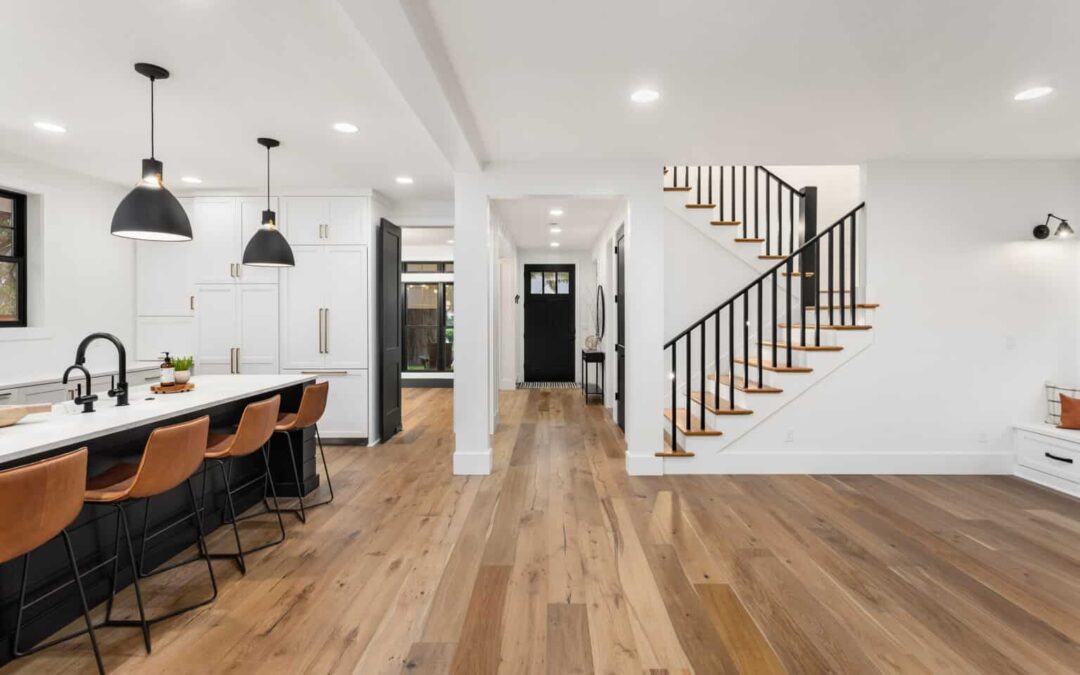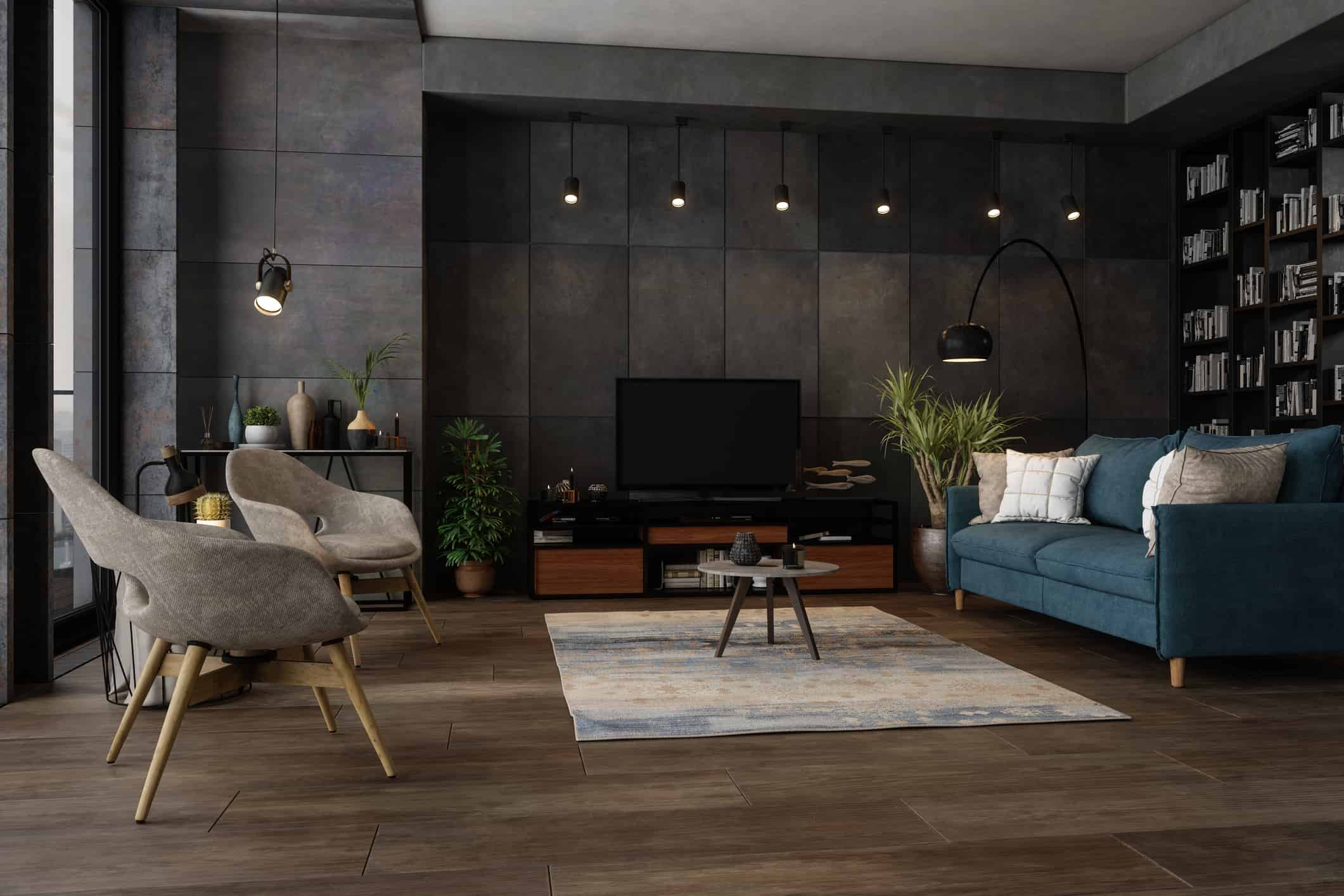Many homeowners dream of having luxurious hardwood flooring throughout their homes, though are often put off by the cost of the project. What many homeowners fail to realize however, is that there is a viable alternative to solid hardwood flooring that looks nearly identical to the real deal but can be purchased for considerably less: engineered hardwood flooring. In this article, we’ll explore the differences between the two in the hope that you’ll feel confident knowing that you picked the right material for your home.
What are the Main Differences Between the Two?
Hardwood flooring is made from milled pieces of hardwood lumber. Species most notably used for solid hardwood flooring include maple, oak, walnut, and cherry. These are all undeniably beautiful species of wood, and, since hardwood planks are nailed directly to the subfloor, a skilled, deft hand is often needed for installation. Solid hardwood flooring can be sanded and refinished as required by wear and tear and as your budget allows. To the untrained eye, engineered hardwood is nearly indistinguishable from solid hardwood flooring. While solid hardwood is used to manufacture engineered hardwood flooring, this is true of only the first layer of the flooring material; the bulk of engineered hardwood is constructed using plywood.
Unlike solid hardwood, installation of engineered hardwood flooring is relatively easy and can be completed by an interested DIY-er. Since most engineered options consist of gluing or interlocking planks, experience and advanced skills are not required for a professionally installed floor. Regrettably, the thin layer of hardwood over a plywood core does mean that engineered hardwood is not a material that can be sanded and finished in the same way a solid hardwood floor can, but having said that, with proper maintenance an engineered hardwood floor can still look great for many, many years.
Aesthetic and Comfort
From a purely aesthetic point of view, there aren’t many points of differentiation between solid hardwood and engineered hardwood floors. At the low and high ends respectively, you’ll generally be able to purchase solid hardwood planks ranging from 8 -12 inches in width. Engineered flooring on the other hand offers more variability in plank width. One thing that may stand out to someone with a trained eye is that once installed, there is less space between solid hardwood planks than there is between engineered hardwood planks. To some, this “tighter fit” may offer a more pleasing aesthetic, but to be fair, it is generally something that would go unnoticed by the average homeowner. Finally, when it comes to finishes, solid hardwood can be purchased either unfinished or pre-finished which offers the homeowner a greater degree of personalization.
Maintenance Requirements
When it comes to performing regular maintenance, both solid and engineered hardwood floors take very little effort. Simply sweep or vacuum loose debris and mop sparingly to treat the occasional stain. For either material you’ll want to mop using a special wood cleaner – do not use water or steam to clean the floor to avoid warping. Solid hardwood likely edges out engineered hardwood in terms of maintenance because sanding and refinishing will breathe new life into the flooring. The thin veneer overlayed over a plywood core makes refinishing an engineered floor a non-starter.
How Long Will Each Last?
In general terms, with proper upkeep and maintenance a homeowner could expect their beautiful hardwood floors to last up to 100 years. Again, it all comes back to the fact that if damaged, a solid hardwood floor can be sanded down and refinished. Even though engineered floors cannot undergo the same refinishing process, they’ll still last upwards of 30 years with proper care. Additionally, damaged planks are relatively easy to replace when required, particularly those that have an interlocking design.
Is Solid Hardwood Better for Resale Value?
This is more of a gray area that can only be substantiated anecdotally and may vary from one city to the next. Generally speaking, prospective homebuyers do tend to place a premium on homes with solid hardwood flooring. By some estimates, installing hardwood floors in your home could net an increase to your home’s sale price an additional 2.5%. Having said that, there is no data to specifically indicate whether an investment in engineered hardwood would yield a similar gain, but since both materials are visually similar, the inclusion of this type of flooring will rarely be a dealbreaker when it comes to the sale of a home.
Which Material is Most Durable?
Since no one lives in the austere environment of a museum, the durability of the materials must be considered. Wet and humid – suffice it to say that hardwood is much more sensitive to these environmental conditions than other building materials. Wet wood can swell, warp, split, and rot. In dealing with these conditions, engineered hardwood flooring is a better alternative. To be clear, if the space you’re renovating contains high levels of humidity it may be worth it to look at other flooring materials. All else being equal, the plywood core of engineered hardwood makes it less likely to warp or swell in the presence of moisture.
Finally, Let’s Talk About Price
A lot of times, the cost of a building material can dictate what is used. As you might expect, solid hardwood flooring planks that are milled from solid pieces of lumber are more expensive than the engineered alternative. The difference in price is not inconsiderable; depending on which types of wood you’re considering; a solid hardwood floor can very well end up costing you roughly 2x to 4x as much per square foot. When you extrapolate that difference over the square footage of a room, hallway, or floor of your home, the difference in price can be staggering. Having said that, considering that a well-maintained solid hardwood floor could very well have a lifespan three times longer than an engineered hardwood floor, the investment may prove a better financial decision over the long term.
The Same, but Very Different
While they may seem the same visually, there are several subtle differences between solid hardwood flooring and engineered flooring, and any of these differences may very well sway your decision one way or the other. For more information on choosing between solid hardwood and engineered hardwood floors for your home, contact Sarana Tile today.


